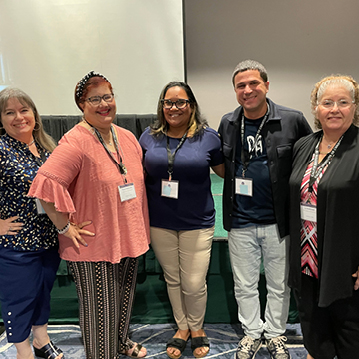La Reverenda, Luz Maldonado, y el líder laico, Josué Rivera, comparten con detalles el proceso del proyecto “De Generación en Generación,” que trajo resultados positivos a la congregación.
Para la iglesia en mención, era importante hacer los ajustes necesarios, ya que esta congregación solamente tiene un servicio de adoración por semana, al que llegan todos sus congregantes. Entonces, ¿cómo hacerlo de tal modo que pueda cubrir las expectativas y las necesidades de todos y todas? Gracias al apoyo y acompañamiento del Programa de Becas Adoración Vital, Predicación Vital del Calvin Institute of Christian Worship (CICW), eso se hizo posible.
Cómo empezaron
Iniciaron con un diálogo abierto para entender la mentalidad de cada una de las tres generaciones que agrupa la iglesia. “Había que hablar y entender el modo de pensar de esas generaciones, porque con etnias hemos podido lidiar; hemos aprendido los vocabularios y aprendido de las culturas, pero cuando estamos hablando de generaciones, se suman cambios tradicionales,” dijo la Reverenda Luz.
Es por eso que intencionalmente empezaron a motivar a las diversas generaciones para que se puedan entender e integrar y así aprender a aceptarse unos a otros. “Para eso, formamos grupos de seis personas, conformado por dos representantes de la primera, de la segunda y de la tercera generación. Todos reunidos en el mismo lugar opinando acerca del culto de adoración, sobre qué les gusta y qué no les gusta, y qué quisieran retirar del programa. Entonces cada generación se pudo escuchar y analizar sus puntos de vista,” añadió la Reverenda Luz.
Aprendizaje de la primera generación
La situación se hacía un poco más complicada porque había una mayoría de primera generación en el liderazgo, controlando las actividades de la iglesia. Como es usual, los adultos de primera generación pensaban que los jóvenes eran muy inmaduros para asumir responsabilidades eclesiásticas. A estos jóvenes, solamente se les proveía la información teológica necesaria pero no se les invitaba a asumir mayores responsabilidades.
“Tuvimos que cambiar el modo de acercarnos a otras generaciones,” dijo el líder Josué Rivera. Porque cuando llegó la hora de implementar el proyecto, los líderes aprendieron que debían cambiar la manera de comunicarse con otras generaciones. “Para nosotros fue algo de gran bendición porque pudimos comprender más a esta generación. Por ejemplo, pueden estar manejando diferentes aparatos electrónicos y a la misma vez pueden estar atendiéndonos. Además, nos hacían ver en qué estábamos equivocados,” puntualizó Josué.
Juntar a las tres generaciones no fue fácil, en especial por la resistencia que puso todo el tiempo la primera generación. No fue fácil para los adultos sentarse a escuchar los jóvenes, en especial porque no dominan el español, ya que el inglés es su primera lengua. Pero no sólo eso, también la forma de expresarse. “Tuvimos mucha resistencia de la primera generación. ¿Por qué? Porque su cultura y su tradición y su entendimiento bíblico teológico no hacía posible que ellos abrieran la mente para entender que había que hacer cambios. Por su parte, los jóvenes, cuando miran a la primera generación, los ven ancianos y anticuados. Pero hemos logrado planificar y trabajar juntos,” dijo la Reverenda Luz.
Al preguntarle a la reverenda sobre algún evento particular en medio de los cambios, ella, con sonrisa en los labios, relata la oposición de uno de los ancianos de la congregación cuando se planeó pintar color negro dos paredes en el santuario, debido a las luces que iban a usar. Él se acercó y dijo que tuvo una visión: “Eso es del diablo, eso es del diablo. Tuve una visión porque Dios no se mueve en la oscuridad y eso no se puede hacer.” Es por eso que la Reverenda Luz ha trabajado fuertemente en un proceso educativo teológico, para que quienes tenían dudas puedan entender el porqué de los cambios.
Los cambios y los logros
El local de la Iglesia Metodista Unida Nuevo Pacto de Sebring ahora luce diferente. La estructura del altar tiene otra apariencia, aparte de los colores de las paredes. Antes era completamente tradicional, con velitas, cruces, las flores, y otros símbolos. Pero eso no ejercía ninguna motivación a los jóvenes, aunque para la primera generación cada detalle era muy valioso. “Bajar eso de ahí fue un sacrilegio para primera generación. Sin embargo, al ellos ver cómo los jóvenes están ahí, involucrados en la organización, cantando y tocando, ha permitido la aceptación,” añadió la reverenda.
Uno de los ministerios que más ha logrado interactuar juntos en tres generaciones ha sido el Ministerio de Danza Litúrgica de la Adoración en la iglesia. Madre, hija, y nieta, juntas danzando en el mismo grupo. Tampoco fue fácil porque las jóvenes querían un tipo de danza con movimientos más elásticos, cuando las abuelas y las mamás no tienen la misma flexibilidad. Pero han llegado a un punto intermedio al dejar que las jóvenes ejecuten las rutinas más exigentes o más contemporáneas.
Recientemente, una jovencita recibió el desafío de predicar en el Día de la Madre. Nunca había tenido una oportunidad como ésta, por lo que acudió a la reverenda para expresar su preocupación. La Reverenda Luz le dio unas cuantas ideas y de paso le confesó que probablemente ella misma debió haber cometido errores, pero si no hubiera sido por esa experiencia, no habría llegado a ser lo que es ahora. “No trates de imitar a nadie, no trates de imitarme a mí, no trates de ser lo que tú no eres. La experiencia que tú tienes con el Señor y con el Espíritu Santo es lo que tú necesitas para transmitir el mensaje. Y edúcate, y sigue aprendiendo porque de eso se trata,” fue el consejo de la reverenda.
Actualmente, la variedad de los temas musicales que se interpretan, el modo de ejecutarlos, la manera en que la reverenda expone sus sermones, usando palabras que puedan ser entendidas por las diferentes generaciones, han hecho una diferencia. “Tratamos de hacer un balance, una mezcla para que todas las generaciones se sientan en libertad y se sientan cómodos a la hora de alabar al Señor. Yo llevo 38 años pastoreando y era bien litúrgica, pero ya no adoramos como lo hacía Abraham, como lo hacía Moisés, ¿verdad? Y a nosotros nos toca dejar un buen legado y preparar a los jóvenes para que ellos sigan adelante”, añadió la pastora.
Mea culpa
La Reverenda Luz reflexiona acerca de las maneras en que antes se ejercía el trabajo de iglesia. Con nostalgia expresó su tristeza por el acercamiento a los jóvenes en el pasado y por no darles oportunidades en el liderazgo. “Yo he sentido pena en mi corazón, porque hace muchos años, a la juventud le imponíamos, le dábamos información. Ahora me doy cuenta de que no puedo imponerle mi tradición, mi cultura, y mi experiencia. Ellos tienen que vivir su propia experiencia. Entonces lo que les estamos dando ahora, los motiva a ponerlo en práctica. Porque si no le damos la oportunidad de que ellos se involucren en el ministerio y se sientan cómodos haciéndolo, no por obligación, sino porque sale de su corazón, no vamos a poder permitir que ellos tengan esa experiencia con el Señor,” dijo la Reverenda Luz.
Agradecimiento al Calvin
Finalmente, agradecieron al Calvin Institute of Christian Worship por la oportunidad que les dieron de participar de este programa. Porque ha enriquecido sus vidas y porque han podido integrarse como un solo cuerpo para adorar al Señor. “Hemos aprendido mucho unos de los otros. Gracias porque no nos imponen un programa, sino que nos dan la oportunidad de ser creativos, darnos herramientas y caminar con nosotros,” finalizó la Reverenda Luz Maldonado.

PROJECT BRINGS TOGETHER THREE GENERATIONS FOR GOD’S KINGDOM
The task of creating a truly meaningful worship service for people from different ethnicities, cultures, and generations was the main challenge faced by the leadership of Nuevo Pacto United Methodist Church in Sebring, Florida. Rev. Luz Maldonado and lay leader Josué Rivera detailed the development of their project “De Generación en Generación” ("From Generation to Generation,") which produced positive results for the congregation.
For Nuevo Pacto, it was important to make several logistical adjustments, being that they only hold one worship service per week. How to do this in a way that meets the expectations and needs of everyone involved? Thanks to the support and accompaniment of the Vital Worship, Vital Preaching Grant Program of Calvin Institute of Christian Worship, this goal was accomplished.
How It Began
Church leaders first held an open dialogue to understand the mindset of each of the three generations represented within the church. "We needed to speak and understand the way people from different generations think. Ethnic diversity? That we can handle, as we’ve learned much about different vernaculars and cultures. But when it comes to generational difference, the changing of traditions must take place," said Pastor Luz Maldonado.
So they began to intentionally motivate the various generations to understand and integrate with one another, learning to better accept each other. "To achieve that, we formed groups of six people, consisting of two representatives from the first, second, and third generations. They all gathered in the same place to give their opinions about the worship service, what they liked, what they didn't like, and what they would like to remove from the program. Each generation was heard and each of their viewpoints were analyzed," added Pastor Luz.
The First Generation’s Lessons
The situation became a little more complicated because there was a majority of first-generation folks in leadership, controlling the church's activities. As usual, the first-generation adults thought that younger people were too immature to assume ecclesiastical responsibilities. The younger generations were being given adequate theological training at Nuevo Pacto but were not being invited to take on greater responsibilities.
When the time came to implement the project, leaders learned that they had to change the way they communicated with the other generations. "For us, it was a great blessing because we could understand this [younger] generation better,” shared leader Josué Rivera. “For example, youth can be on their electronic devices while also paying attention to what is happening during service. They also showed us where we were mistaken," Josué emphasized.
Bringing the three generations together was not easy, especially due to the resistance put up by the first gens. It was not easy for the adults to sit and listen to the young people, especially because most of the youth are not fluent Spanish speakers, with English being their first language. Not only that, but there were also differences in the ways of self-expression. "We faced a lot of resistance from the first generation. Why? Because their culture, tradition, and theological understanding did not allow them to open their minds to the idea of making changes. On the other hand, the young people saw the first generation as elderly and old-fashioned. But we’ve managed to plan and work together," said Reverend Luz.
With a smile, Reverend Luz recounts the pushback from one of the elders when it was announced that two of the worship hall walls would be painted black, due to a new light installation. The disgruntled elder approached leadership and said God had given him a vision: "That is from the devil, that is from the devil. I had a vision because God does not move in the darkness, and that cannot be done." This is why Reverend Luz has worked diligently on a theological educational process, so that doubtful church members can better understand the reasoning behind such changes.
The Changes and Achievements
The Nuevo Pacto United Methodist Church looks different now. Apart from the wall colors, the altar structure has a different appearance. It used to be entirely traditional, with candles, crosses, flowers, and other symbols. Though every detail was valuable to the first generation, it did not motivate the young folks. "Taking those things down was considered sacrilege for the first generation. However, when they saw the young people involved in the organization, singing, and playing instruments, they accepted the changes," Reverend Luz shared.
One of the ministries that has managed to interact well across all three generations is Nuevo Pacto’s Liturgical Dance Worship Ministry. Here mothers, daughters, and granddaughters can dance together. It was not easy. Younger members wanted a type of dance with more elastic movements, whereas the grandmothers and mothers did not have the same physical flexibility. A compromise was reached by letting the young people perform the more demanding or contemporary routines.
Recently, a teenage girl received the challenge of preaching on Mother's Day. She had never done something like this before, so she approached Reverend Luz with concerns. The reverend gave her a few ideas and also confessed that she had made preaching mistakes herself in the past. She shared that if it hadn't been for those experiences, she wouldn't be who she is now. "Don't try to imitate anyone, don't try to imitate me, don't try to be what you are not. The experience you have with the Lord and the Holy Spirit is what you need to convey the message. Educate yourself and keep learning because that's what it's about," Reverend Luz advised.
The variety in the worship songs that are now performed, the way they’re executed, and the manner in which Reverend Luz delivers her sermons using words that can be understood by different generations has all made a significant difference. Reverend Luz said, "We try to strike a balance, a blend so that all generations feel free and comfortable when praising the Lord. I have been pastoring for 38 years. I used to be very liturgical, but we don't worship the way Abraham did, or Moses, right? It's our job to leave a good legacy and prepare the youth to continue the work."
Mea Culpa
During the interview, Reverend Luz also reflected on how church work was done in the past. She expressed sadness regarding the way she used to fail to give young people leadership opportunities in the church. "I feel badly about it because, many years ago, we used to impose knowledge on the youth. Now I realize that I cannot impose my tradition, culture, and experience on them. They have to live their own experience. So what we’re offering now motivates them to put the knowledge into practice. If we don't give them the opportunity to get involved in ministry and feel comfortable doing it––not out of obligation but because it comes from the heart––they won’t be able to experience ministry with the Lord," said Reverend Maldonado.
Gratitude to Calvin
Finally, leaders at Nuevo Pacto express their gratitude to the CICW for the opportunity of participating in this program. It has enriched their lives, allowing them to come together as one body to worship the Lord. "We have learned a lot from each other. Thank you for not imposing a program on us but giving us the opportunity to be creative, providing us with tools, and walking beside us along the way," shared Reverend Luz.

